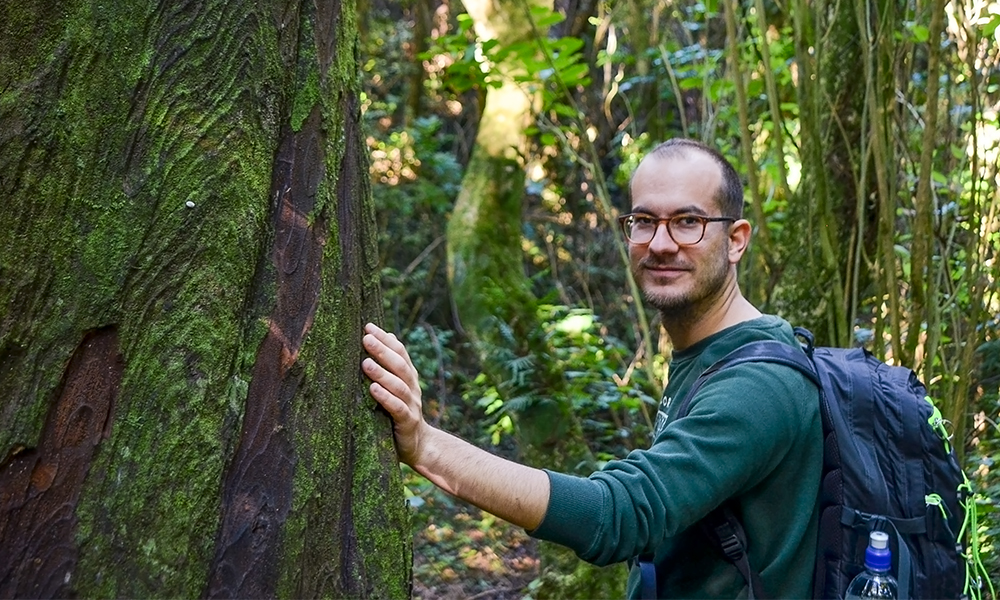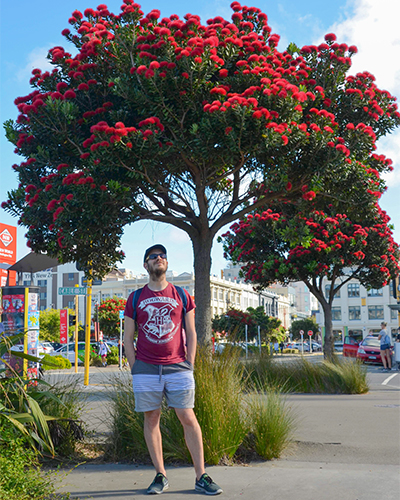Environment & Sustainability, People, Research
Dr. Fabio Mologni is exploring biological invaders
December 12, 2022

About
Name
Fabio Mologni
Role
Postdoctoral Fellow
Faculty
Irving K. Barber Faculty of Science
Department
Biology
Campus
Okanagan (Kelowna, BC)
Education
PhD (Biogeography), Te Herenga Waka/Victoria University of Wellington, New Zealand
Master of Natural Sciences (Plant Ecology), Università degli Studi di Milano, Italy
Bachelor of Natural Sciences (Plant Ecology), Università degli Studi di Milano, Italy
Hometown
Bergamo, Italy
"I have a profound love for nature and diversity, whatever form it takes, and so I feel the urge to contribute to protecting it from our own mistakes. Someone once said that whoever caused a problem cannot provide solutions as well. However, if not us, then who?"
Tell us about your research—what do you do and why is it important?
One of the major threats to biodiversity is biological invasions. Put simply, plants and animals travel with us. As the world is increasingly interconnected, more and more species will reach places where they do not occur naturally. These species—called exotic or non-native—sometimes become invasive, ultimately displacing native species. This leads to simplified ecosystems and increased extinction risks of endangered species. Here in British Columbia, I aim to better understand the impacts of invasive species in riparian ecosystems, especially when they compound one another.
As a sidekick, I also explore how humans are currently distributed on islands. Do we behave like other plants and animals? Or do we show unique distributional patterns? My boldest long-term goal is to produce a general theory for the island biogeography of modern humans.
What inspires you about your work?
I have a profound love for nature and diversity—whatever form it takes—and so I feel the urge to contribute to protecting it from our own mistakes. Someone once said that whoever caused a problem cannot provide solutions as well. However, if not us, then who?

Pōhutukawa trees in New Zealand sprout massive roots from their trunk and branches that just hang in the air until they find a surface to attach to. Pictured is Dr. Mologni with a very young pōhutukawa.
What are some challenges you’ve faced in your academic career so far?
First is the language barrier. This was, to me, the greatest challenge in achieving academic independence. It’s a daunting task to produce material at the highest level in a language that isn’t yours and with little formal education. It requires quite a lot of persistence. Halfway through my doctorate though, I began developing physical and mental symptoms consistent with the chronic illness fibromyalgia. I was officially diagnosed a few months ago. People say “the illness does not take a day of your life, but makes every day a struggle,” and I can relate to that. There is no cure and little medication available, except for a lot of light physical activity. I had to reorganize my whole life around that. It is not always easy to talk about chronic illness in the workplace and we desperately need to normalize these kinds of discussions.
What’s the best advice you can give students about career choices and schooling?
Be curious in everything that surrounds you. Take the opportunity to talk and learn from everybody and every situation. Experiment! Things don’t always go as planned; get it wrong sometimes. If you are a graduate student, make sure you pick a supervisor who shares the same passion as you for the subject you want to research. If you are a PhD, there is life after your doctorate, trust me.
Do you have any books you would suggest as must-reads?
We will need another set of questions for this one alone. I’ll narrow it down to five books I believe are useful in academia, at all levels. First is Atomic Habits by James Clear. It provides an excellent way to implement new habits in your routine, which can be summarized as “baby, consistent steps.”
Next is Managing your Mental Health During your PhD: A Survival Guide by Zoë Ayres. Student or staff, this is a must-read. It describes the challenges students might (or will eventually) face and how to manage multiple stressors. Most importantly, these obstacles are not restricted to students alone.
I suggest two books from Helen Sword, The Writer’s Diet and Stylish Academic Writing, both excellent for improving your academic writing skills.
Last but not least, I am currently reading Research is Ceremony, by Shawn Wilson. Any western academic should read it. It puts into question the very foundations of our research paradigms, suggesting there are other ways to produce knowledge and do science.